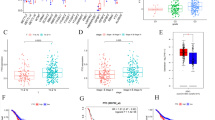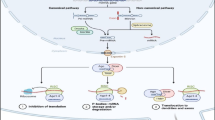Abstract
Oral cancer due to betel quid chewing habit is very common in South Asian countries. We attempted to detect the presence of a novel gene in epithelial cells stimulated with arecoline, a main component of betel quid. Human gingival epithelial progenitors were cultured and treated with a 3-day alternating regimen with/without 50 μg/ml arecoline for 1 month. DNA microarray and methylation arrays were analyzed to identify the candidate genes. Immunohistochemical staining was performed in the tissue samples. Genome-wide analyses, quantitative reverse transcription PCR and quantitative methylation-specific PCR revealed DUSP4 as the most significant and promising gene. The methylation levels of DUSP4 were significantly higher in the betel quid-related oral squamous cell carcinoma (OSCC) than those in the non-related OSCC and controls (Mann–Whitney U test, p < 0.05). The number of DUSP4 immunopositive cells in betel quid-related OSCC was significantly higher than those from the non-chewing patients and the controls (p < 0.05). Hypermethylation of DUSP4 may be considered as a specific event in betel quid-related oral cancer.





Similar content being viewed by others
References
Lee CH, Ko AM, Warnakulasuriya S, Yin BL, Sunarjo ZRB, Ibrahim SO, Liu ZW, Li WH, Zhang SS, Kuntoro UB, Rajapakse PS, Warusavithana SA, Razak IA, Abdullah N, Shrestha P, Kwan AL, Shieh TY, Chen MK, Ko YC (2011) Intercountry prevalences and practices of betel-quid use in south, southeast and eastern Asia regions and associated oral preneoplastic disorders: an international collaborative study by Asian betel-quid consortium of south and east Asia. Int J Cancer 129:1741–1751
Asthana S, Labani S, Kailash U, Sinha DN, Mehrotra R (2018) Association of smokeless tobacco use and oral cancer: a systematic global review and meta-analysis. Nicotine Tob Res 21:1162–1171
Petti S (2009) Lifestyle risk factors for oral cancer. Oral Oncol 45:340–350
Irimie IA, Ciocan C, Gulei D, Mehterov N, Atanasov GA, Dudea D, Berindan-Neagoe I (2018) Current insights into oral cancer epigenetics. Int J Mol Sci 19:670
Coppede F, Lopomo A, Spisni R, Migliore L (2014) Genetic and epigenetic biomarkers for diagnosis, prognosis and treatment of colorectal cancer. World J Gastroenterol 20:943–956
Cao J, Zhou J, Gao Y, Gu L, Meng H, Liu H, Deng D (2009) Methylation of p16 CpG island associated with malignant progression of oral epithelial dysplasia: a prospective cohort study. Clin Cancer Res 15:5178–5183
Takai R, Uehara O, Harada F, Utsunomiya M, Chujo T, Yoshida K, Sato J, Nishimura M, Chiba I, Abiko Y (2016) DNA hypermethylation of extracellular matrix-related genes in human periodontal fibroblasts induced by stimulation for a prolonged period with lipopolysaccharide derived from Porphyromonas gingivalis. J Periodontal Res 51:508–517
Keyse SM (2008) Dual-specificity MAP kinase phosphatases (MKPs) and cancer. Cancer Metastasis Rev 27:253–261
Zhang R, Wang G, Zhang PF, Zhang J, Huang YX, Lu YM, Da W, Sun Q, Zhu JS (2017) Sanguinarine inhibits growth and invasion of gastric cancer cells via regulation of the DUSP4/ERK pathway. J Cell Mol Med 21:1117–1127
Liu Y, Du F, Chen W, Yao M, Lv K, Fu P (2013) Knockdown of dual specificity phosphatase 4 enhances the chemosensitivity of MCF-7 and MCF-7/ADR breast cancer cells to doxorubicin. Exp Cell Res 319:3140–3149
Schmid CA, Robinson MD, Scheifinger NA, Muller S, Cogliatti S, Tzankov A, Muller A (2015) DUSP4 deficiency caused by promoter hypermethylation drives JNK signaling and tumor cell survival in diffuse large B cell lymphoma. J Exp Med 212:775–792
Uehara O, Takimoto K, Morikawa T, Harada F, Takai R, Adhikari BR, Itatsu R, Nakamura T, Yoshida K, Matsuoka H, Nagayasu H, Saito I, Muthumala M, Chiba I, Abiko Y (2017) Upregulated expression of MMP-9 in gingival epithelial cells induced by prolonged stimulation with arecoline. Oncol Lett 14:1186–1192
Livak KJ, Schmittgen TD (2001) Analysis of relative gene expression data using real-time quantitative PCR and the 2(-Delta Delta C(T)) method. Methods 25:402–408
Li LC, Dahiya R (2002) MethPrimer: designing primers for methylation PCRs. Bioinformatics 18:1427–1431
Lu L, Katsaros D, Rigault de la Longrais IA, Sochirca O, Yu H (2007) Hypermethylation of let-7a-3 in epithelial ovarian cancer is associated with low insulin-like growth factor-II expression and favorable prognosis. Cancer Res 67:10117–10122
Ichimanda M, Hijiya N, Tsukamoto Y, Uchida T, Nakada C, Akagi T, Etoh T, Iha H, Inomata M, Takekawa M, Moriyama M (2018) Downregulation of dual-specificity phosphatase 4 enhances cell proliferation and invasiveness in colorectal carcinomas. Cancer Sci 109:250–258
Wang HY, Cheng Z, Malbon CC (2003) Overexpression of mitogen-activated protein kinase phosphatases MKP1, MKP2 in human breast cancer. Cancer Lett 191:229–237
Sieben NL, Oosting J, Flanagan AM, Prat J, Roemen GM, Kolkman-Uljee SM, van Eijk R, Cornelisse CJ, Fleuren GJ, van Engeland M (2005) Differential gene expression in ovarian tumors reveals Dusp 4 and Serpina 5 as key regulators for benign behavior of serous borderline tumors. J Clin Oncol 23:7257–7564
Kao DD, Oldebeken SR, Rai A, Lubos E, Leopold JA, Loscalzo J, Handy DE (2013) Tumor necrosis factor-alpha-mediated suppression of dual-specificity phosphatase 4: crosstalk between NFkappaB and MAPK regulates endothelial cell survival. Mol Cell Biochem 382:153–162
Waha A, Felsberg J, Hartmann W, von dem Knesebeck A, Mikeska T, Joos S, Wolter M, Koch A, Yan PS, Endl E, Wiestler OD, Reifenberger G, Pietsch T, Waha A (2010) Epigenetic downregulation of mitogen-activated protein kinase phosphatase MKP-2 relieves its growth suppressive activity in glioma cells. Cancer Res 70:1689–1699
Balko JM, Cook RS, Vaught DB, Kuba MG, Miller TW, Bhola NE, Sanders ME, Granja-Ingram NM, Smith JJ, Meszoely IM, Salter J, Dowsett M, Stemke-Hale K, González-Angulo AM, Mills GB, Pinto JA, Gómez HL, Arteaga CL (2012) Profiling of residual breast cancers after neoadjuvant chemotherapy identifies DUSP4 deficiency as a mechanism of drug resistance. Nat Med 18:1052–1059
Gaggianesi M, Turdo A, Chinnici A, Lipari E, Apuzzo T, Benfante A, Sperduti I, Di Franco S, Meraviglia S, Lo Presti E, Dieli F, Caputo V, Militello G, Vieni S, Stassi G, Todaro M (2017) IL4 primes the dynamics of breast cancer progression via DUSP4 inhibition. Cancer Res 77:3268–3279
Hijiya N, Tsukamoto Y, Nakada C, Tung Nguyen L, Kai T, Matsuura K, Shibata K, Inomata M, Uchida T, Tokunaga A, Amada K, Shirao K, Yamada Y, Mori H, Takeuchi I, Seto M, Aoki M, Takekawa M, Moriyama M (2016) Genomic loss of DUSP4 contributes to the progression of intraepithelial neoplasm of pancreas to invasive carcinoma. Cancer Res 76:2612–2625
Saigusa S, Inoue Y, Tanaka K, Toiyama Y, Okugawa Y, Shimura T, Hiro J, Uchida K, Mohri Y, Kusunoki M (2013) Decreased expression of DUSP4 is associated with liver and lung metastases in colorectal cancer. Med Oncol 30:620
Nees M, Homann N, Discher H, Andl T, Enders C, Herold-Mende C, Schuhmann A, Bosch FX (1993) Expression of mutated p53 occurs in tumor-distant epithelia of head and neck cancer patients: a possible molecular basis for the development of multiple tumors. Cancer Res 53:4189–4196
Hsiao WY, Lin YC, Liao FH, Chan YC, Huang CY (2016) Dual-specificity phosphatase 4 regulates STAT5 protein stability and helper T cell polarization. PLoS ONE 10:e0145880
Su H, Tran NT, Guo H, Luo M, Zhao X (2015) PRMT1-mediated methylation of DUSP4 determines megakaryocyte-erythroid lineage choice by regulating p38 signaling. Blood 126:2387–2387
Author information
Authors and Affiliations
Corresponding author
Ethics declarations
Conflict of interest
The authors declare no conflict of interest in any component of this study and the manuscript.
Additional information
Publisher's Note
Springer Nature remains neutral with regard to jurisdictional claims in published maps and institutional affiliations.
Rights and permissions
About this article
Cite this article
Adhikari, B.R., Yoshida, K., Paudel, D. et al. Aberrant expression of DUSP4 is a specific phenomenon in betel quid-related oral cancer. Med Mol Morphol 54, 79–86 (2021). https://doi.org/10.1007/s00795-020-00265-3
Received:
Accepted:
Published:
Issue Date:
DOI: https://doi.org/10.1007/s00795-020-00265-3




